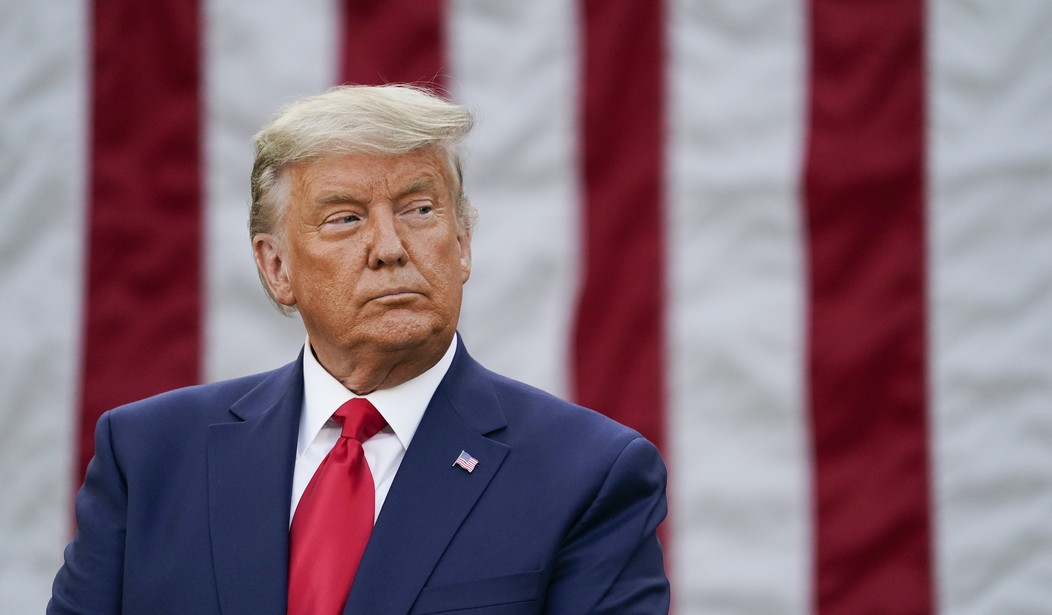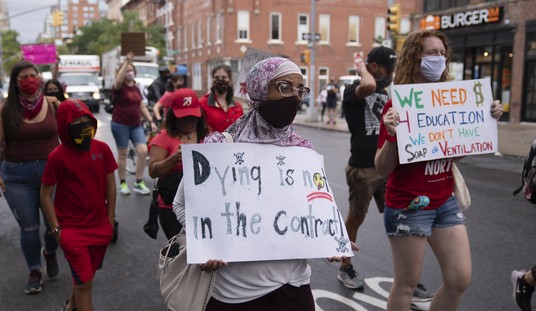On Wednesday, President Donald Trump announced he would join the explosive case Attorney General Ken Paxton (R-Texas) filed at the Supreme Court this week. No fewer than seventeen other states also urged the Supreme Court to take up the case. Paxton’s case urges the Court to block swing states from certifying “unlawful election results,” to remand the election to state legislatures for review, and to direct the legislatures to reverse the unlawful actions of election officials by choosing Electoral College electors themselves.
“We will be INTERVENING in the Texas (plus many other states) case. This is the big one,” the president announced on Twitter. “Our Country needs a victory!”
It remains unclear exactly how Trump and his legal team aim to intervene in the case. Should the Supreme Court grant certiorari and take up the case, Trump could file an amicus curiae (“friend of the court”) brief, but the promise to “intervene” seems more aggressive than that.
On Wednesday, Missouri led a group of 17 states in filing a brief that echoes the Texas claims. Alabama, Arkansas, Florida, Indiana, Kansas, Louisiana, Mississippi, Montana, Nebraska, North Dakota, Oklahoma, South Carolina, South Dakota, Tennessee, Utah, and West Virginia joined the Missouri brief.
“The Bill of Complaint alleges that non-legislative actors in each Defendant State unconstitutionally abolished or diluted statutory safeguards against fraud enacted by their state Legislatures, in violation of the Presidential Electors Clause,” the brief states, Fox News reported.
“All the unconstitutional changes to election procedures identified in the Bill of Complaint have two common features: (1) They abrogated statutory safeguards against fraud that responsible observers have long recommended for voting by mail, and (2) they did so in a way that predictably conferred partisan advantage on one candidate in the Presidential election,” the brief alleges.
Paxton’s case contests the results in Georgia, Michigan, Pennsylvania, and Wisconsin.
“As set forth in the accompanying brief and complaint, the 2020 election suffered from significant and unconstitutional irregularities in the Defendant States,” Paxton argues in the brief. The Texas brief lists three kinds of violations of federal law:
Non-legislative actors’ purported amendments to States’ duly enacted election laws, in violation of the Electors Clause’s vesting State legislatures with plenary authority regarding the appointment of presidential electors.
Intrastate differences in the treatment of voters, with more favorable allotted to voters – whether lawful or unlawful – in areas administered by local government under Democrat control and with populations with higher ratios of Democrat voters than other areas of Defendant States.
The appearance of voting irregularities in the Defendant States that would be consistent with the unconstitutional relaxation of ballot-integrity protections in those States’ election laws.
These three broad claims echo many of the Trump campaign’s lawsuits challenging the presidential election results in those states.
EXPLOSIVE: Texas Asks Supreme Court to Block ‘Unlawful Election Results’ in Swing States
The Electors Clause in the U.S. Constitution states that only state legislatures may direct how states choose electors in the Electoral College. Election officials allegedly violated that clause by altering election procedures in violation of state law (enacted by the legislatures), ostensibly in order to help people vote during the Wuhan coronavirus pandemic.
State elections officials also treated some voters more favorably in more Democratic-leaning areas of states, helped in that effort by the Center for Tech and Civic Life (CTCL), an organization that directed funds to election officials in such areas.
Finally, while many election officials relaxed voting standards in order to help voters worried about COVID-19, those relaxed standards made potential fraud more likely.
“All these flaws – even the violations of state election law – violate one or more of the federal requirements for elections (i.e., equal protection, due process, and the Electors Clause) and thus arise under federal law,” Paxton’s brief argues, citing Bush v. Gore (2000).
Texas “respectfully submits that the foregoing types of electoral irregularities exceed the hanging-chad saga of the 2000 election in their degree of departure from both state and federal law.”
Importantly, Paxton claims that “these flaws cumulatively preclude knowing who legitimately won the 2020 election and threaten to cloud all future elections.”
The lawsuit asks the Supreme Court to block certification of election results, to direct swing-state legislatures to review the results, and direct the legislatures to award electors based on legal ballots only. Such an order would fall in line with the legislative strategy President Donald Trump’s attorneys Jenna Ellis and former New York Mayor Rudy Giuliani have supported.
On Monday, Ellis outlined the strategy, predicting that state legislatures in Arizona, Georgia, Pennsylvania, and Michigan will independently investigate the election results and flip the electors from Joe Biden to Trump.
Republicans hold an edge over Democrats in each of the states mentioned. Ellis mentioned Arizona (11 electoral votes), where Republicans control the House (31 seats to 29 seats) and the Senate (17 seats to 13 seats). Both Ellis and Paxton noted Georgia (16 electoral votes), where Republicans control the House (103 seats to 75 seats) and the Senate (35 seats to 21 seats); Pennsylvania (20 electoral votes), where Republicans control the House (113 seats to 90 seats) and the Senate (28 seats to 21 seats); and Michigan (16 electoral votes), where Republicans control the House (58 seats to 52 seats) and the Senate (22 seats to 16 seats). Paxton mentioned Wisconsin (10 electoral votes), where Republicans control the State Assembly (63 seats to 35 seats) and the Senate (19 seats to 14 seats).
If the legislatures in states Jenna Ellis named flip for Trump, that would represent 63 electoral votes, flipping the election from 306 electoral votes for Biden and 232 for Trump to 295 electoral votes for Trump and 243 for Biden. If the legislatures in states Paxton named flip for Trump, that would represent 62 electoral votes, flipping the election from 306 electoral votes for Biden and 232 for Trump to 294 electoral votes for Trump and 244 for Biden.
Heritage Foundation election expert Hans von Spakovsky noted the strength of Texas’ claims, but he warned that the Supreme Court “may be extremely leery and disinclined” to take up the “unprecedented lawsuit.”
“Texas does a good job of describing what happened in each state and why the actions of government officials making unauthorized, unilateral changes in the rules may have violated the Constitution and affected the outcome of the election,” von Spakovsky notes. “But by almost any measure, this is the legal equivalent of a Hail Mary pass. While the questions raised are serious ones, it is unlikely that the Supreme Court will address them at this time.”
Trump may intend to add gravitas to the Texas suit, but his move to intervene may make the lawsuit appear even more political. I would like to see the Supreme Court take up this case, but the Court rejects far more cases than it takes up, and many justices are leery of getting involved in election matters.
TX v State Motion 2020-12-0… by Breitbart News
Editor’s Note: Want to support PJ Media so we can continue telling the truth about the 2020 election? Join PJ Media VIP TODAY and use the promo code LAWANDORDER to get 25% off your VIP membership.
Tyler O’Neil is the author of Making Hate Pay: The Corruption of the Southern Poverty Law Center. Follow him on Twitter at @Tyler2ONeil.









Join the conversation as a VIP Member